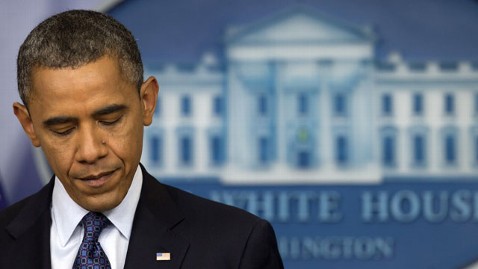'World News' Political Insights: President Obama's Rough Stretch Exposes Weak Spots

(Carolyn Kaster/AP Photo)
ANALYSIS
First went the mood. Next, the muscle failed. Finally, to close out a horrific week for President Obama's reelection bid, went the message.
The first week of June began with a monthly jobs report that solidified a sense of an anemic economic recovery. Then a Democratic loss in Wisconsin, coupled with staggering Romney campaign fundraising figures, revealed the strength of political organization on the right.
The week was punctuated by the most prominent voice in the party short of the president himself undercutting key Obama campaign messaging. To round out the rough patch, the president tried to turn the story lines around, but wound up delivering the kind of line that's tailor-made for his opponents to make famous.
"The private sector is doing fine," President Obama said Friday, at a press conference organized because it most certainly isn't, at least in the minds of most Americans.
The president clarified himself within hours, saying that "it's absolutely clear the economy is not doing fine." Top Obama advisers surely want the episode to go away quickly, and are eager to point out that a bad June is better than a bad October.
"I suspect much of this will be of little consequence," David Axelrod said today on ABC's "This Week with George Stephanopoulos."
But this was about more than losing a few news cycles, or inspiring a few Web videos.
Taken together, the beginning of June 2012 may be remembered as a time period that shook the pillars of the Obama reelection effort. If nothing else, it's shown the 2012 landscape to be so different from 2008 as to make assumptions based on four years ago seem worthless.
The Democratic base, while still solidly behind Obama, has shown signs of atrophy, as the failed recall of Wisconsin Gov. Scott Walker displays. Former President Bill Clinton's comments on Romney's business record and how to handle expiring tax cuts, meanwhile, show fraying of party unity in a way Democrats find all too familiar.
On the other side, the Republican Party and its high-powered allies have clearly improved in terms of organization and focus since 2008 and even 2010. The Walker victory was a psychological boost, and it gave deep-pocketed GOP allies a chance to flex their still-flush wallets.
Plus, the speed and breadth with which Republicans pounced on Obama's "doing fine" comments show a marked improvement on the communications front. Financially, operationally, and strategically, Obama's Chicago team is clearly facing a formidable match in Romney's team in Boston.
One big constant from 2008, to the dismay of Democrats, is the uncertainty of the economy. It's that fact, more than dry runs for campaign organizations or winning ultimately meaningless June news cycles, that could make the past week truly memorable.
Obama's statement about the private sector may be technically defensible, with private-sector job creation far outpacing - and having to compensate for - a public sector that's shedding jobs.
But the danger in the comment is that it undercuts the president's effort to connect with skittish voters on the key issue of the election. The president needs to do more than blame his predecessor for inherited economic conditions; his challenge is to convey a sense of momentum around his policies for job growth.
The Romney comment that Democrats pounced on late in the week, suggesting that the nation needs fewer firefighters, police officers, and teachers, carries roughly similar risk for his attempts to connect on the economy.
The scale, however, is different. Three-and-a-half years of the presidency has given Obama ownership of this economy. That fact may not be just fine for his prospect of a second term.